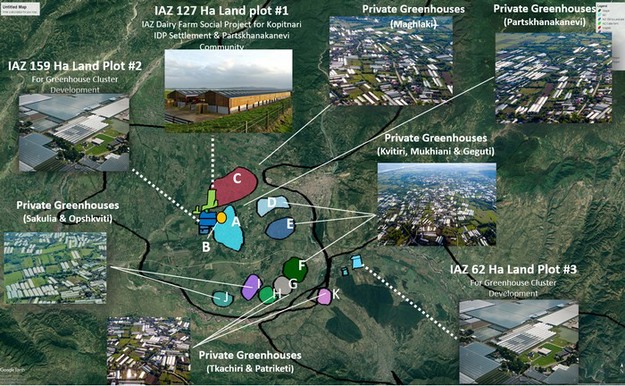Right now it is still a vast area with only some greenhouses with a maximum size of about 1500 sq meter positioned here and there. In a few years it should change beyond recognition into a large horticultural hub. We are talking about the Imereti Agro Zone in Georgia. With support from the Georgian government, commercial companies, both growers and seed suppliers of modern varieties as well as crop protection materials, are being given the opportunity to establish themselves here.

“Over here there’s room for 18.4 hectare of organic cultivation,” shows Archil Bukia, developer of the Imereti Agro Zone. “Then here there’s room for 220 hectare greenhouse cultivation. We’re opting for a mix of low- mid- and high-tech.”
Archil is the deputy director of the Imereti Agro Zone, a greenhouse hub that is being realized in Georgia. It's nearby the city Kutaisi, in the west of the country, closeby to an airport and 4 hours afway from the capital Tblisi. “The area has a great climate, wonderful soils and enough space for both organic as traditional cultivation. Labour costs are low and there’s great market opportunities as the region connects East and West, North and South: the Russian border is nearby,” he says. “Nowadays trucks filled with tomatoes are being driven from Turkey to Russia, via Georgia. We can be a more local food supplier, like Armenia and Azerbaijan.”
This new development of the hub started as a private initiative. In order to facilitate the region better, the government took over and is currently supplying budgets to let companies take care of gas, electricity and infrastructure. The plots are to be sold or leased for a period of 49 years to private companies, without any governmental participation. Currently over 20 companies have shown interest: big international investors, German growing companies and Russian retailers, as well as local parties. “There’s room for a variety of growers: smaller and bigger, low- mid and high-tech, as the hub also is divided in areas to suit these type of companies,” Archil says. “As bigger companies will want to install lighting, we’ll ensure the electric grid to be ready for this, whereas smaller companies might opt for tunnel greenhouses. There’s room for a variety of companies.”
 Mr. Archil Bukia in a recent television show on the developments of the area
Mr. Archil Bukia in a recent television show on the developments of the area
Demo-function
Currently about 5,000 growers are located in the designated area. “The current level of horticulture in Georgia is low-tech and there’s a lack of knowledge on high-tech growing. High-tech companies also have a demo-function for other ones, and we’re also realizing a knowledge- and innovation centre. Some of these companies do want to expand their business and we want to help them do so,” Archil says. Along with big investors also financial partners as Agrokreditbank and Volksbank are participating, as are USAid.
An important feature will also be the establishment of a demo and training centre, where small farmers will be able to get in touch with modern growing techniques, new varieties and more environmental friendly crop protection products. It also aims to promote the cooperative awareness of farmers and promote exchange of information on local level.
In addition to knowledge on growing, they’re also helping these local growers with the facilities that are realized in the greenhouse zone: a packaging and processing area, a logistics platform, a customs area and a collective sales platform, all available for growers and optional for them to join. “Retailers want to do business with growers, but only with growers of a certain scale. By offering them the opportunity to team up when it comes to sales, they can become a partner for sales organizations and without having to deal with middlemen. This example is set by farmers in the area, that are selling their milk collectively to a factory, and can easily be expanded to the fresh produce growers.”
The collective area will also offer room for suppliers to establish themselves in the Imereti Agro Zone, of which over 10 have already shown interest. “Greenhouse builders, but also suppliers of crop utilities, greenhouse shades and crop protection products. And breeders, of course,” Archil says. “Also for those companies a customs zone is available, making it easy to export products outside the country.”
The Imereti Agro Zone has conducted a feasibility study upon which these plans are created. Next month they will share more information in a webinar series that companies can join. “There’s opportunities for local growers, for international growers and investors, for suppliers and for the buyers of fresh produce, including retailers”, Archil summarizes, then adding that also floricultural growers are welcome to join. “Horticulture offers many opportunities and with the Imereti Agro Zone we want to bring this within reach. Now we’re reaching out to companies that can do so.“
Four industry briefings will be held from 5th to 12th of April, 2021. The exact dates of the briefings will be posted on the official website - www.iaz.ge
Fore more information:
Imereti Agro Zone
www.iaz.ge/
info@iaz.ge
